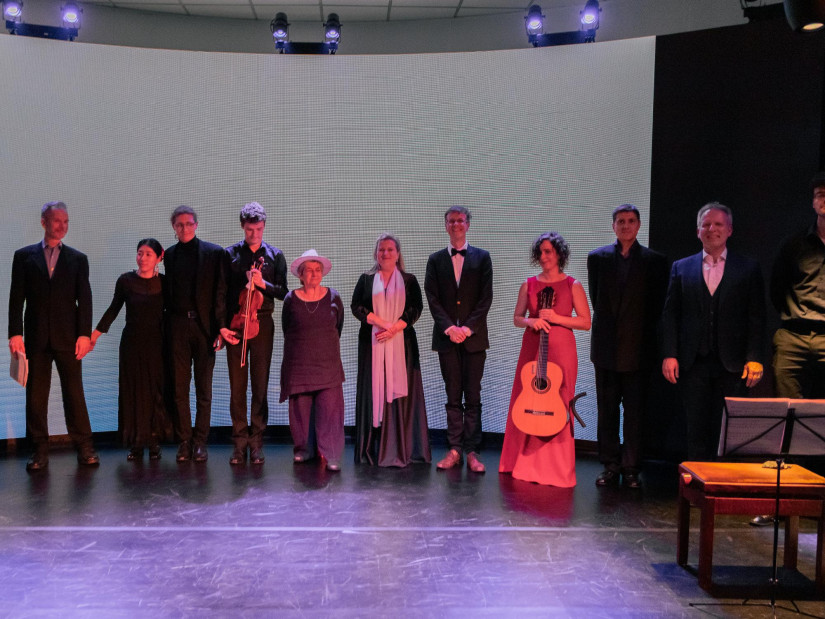One of Kodály's greatest students remembered in London
To celebrate the 120th anniversary of the birth of Mátyás Seiber, a masterclass, a concert, and a panel discussion were held before an exihibition was opened at the Liszt Institute in the UK's capital, in collaboration with the Liszt Academy and the Royal College of Music.
On 2 and 3 May 2025, a two-day masterclass dedicated to Seiber’s chamber works started the series of event at the newly inaugurated centre of the Liszt Institute – Hungarian Cultural Centre in London, located just steps from Trafalgar Square. The sessions were led by Dr László Stachó, professor at the Liszt Academy, and featured Hungarian and British music students: Márton Sárréti (violin) and Áron Rátkay (cello) from the Liszt Academy, Christian Hoddinott (clarinet) and Sophia Lim (piano) from the Royal College of Music in London, as well as soprano Zsófia Bódi, a recent doctoral graduate of the Liszt Academy.
The celebratory concert on 4 May was performed to a full house and showcased a wide selection of Seiber’s chamber music. The programme highlighted the composer’s extraordinary stylistic range and his fluency across musical cultures. Students from the two music academies performed together, joined by László Stachó and Zsófia Bódi. The line-up also featured vocalists Norbert Meyn and Tyrone Landau, guitarist Katalin Koltai, and pianist Christopher Gould. The programme showcased works such as: Sarabande and Gigue in Old Style (an early piece revised decades after its composition during Seiber’s studies with Kodály), Andantino Pastorale, the Bartók-influenced Introduction and Allegro for clarinet, cello, and piano, Phantasy for cello and piano (written during World War II), the virtuosic atonal Concert Piece for violin and piano, three serial and satirical Morgenstern Songs for voice and clarinet, Four French Folk Songs for voice and piano, the cathartic song cycle To Poetry, and Minnaloushe Songs a recently discovered manuscript setting of three short Yeats poems for voice and guitar, unearthed in late 2024. The concert also featured a selection of Seiber’s cabaret songs composed in London, and concluded with a special screening of the legendary 1952 animated film The Owl and the Pussycat – created by fellow Hungarian émigré John Halas – accompanied by a live performance of Seiber’s original film score.
An exhibition opening and panel discussion led into the concert, with the discussion moderated by Norbert Meyn, professor at the Royal College of Music and artistic director of the event. Panellists included Julia Seiber Boyd (the composer’s daughter), musicologist Dr Florian Scheding (University of Bristol), and Dr László Stachó (Liszt Academy of Music). The exhibition, curated by Norbert Meyn and opened by Botond Zákonyi, Director of the Liszt Institute, offered a comprehensive overview of Seiber’s life and musical legacy. It was complemented by the Royal College of Music’s travelling exhibition Music, Migration, and Mobility, which explores the contributions of Seiber and other émigré musicians from Nazi-occupied Europe to British music and culture.
Julia Seiber Boyd – a retired historian and lawyer, and daughter of the composer – served as guest of honour at the event series.
Mátyás Seiber (1905–1960) had a truly European career across Hungary, Germany, and Britain, where he lived after 1935 as a successful composer and influential teacher. Many of Seiber’s compositions – such as his Leichte Tänze for piano, his Jazzolettes, his modernist chamber music, his ‘Nonsense Songs’, his choral and orchestral works, and his film music for the 1954 animation film Animal Farm have – have remained popular to this day.
A favourite student and lifelong friend of Zoltán Kodály, Mátyás Seiber moved to Germany in 1928, where he taught jazz at the Hoch Conservatoire in Frankfurt before being expelled by the Nazis in 1933. In Britain, he composed pastoral and modernist chamber music, choral and orchestral works, as well as folk song arrangements, light music, and film scores – for many prominent soloists including Tibor Varga, Max Rostal, Dennis Brain, Julian Bream, and Peter Pears. He was a member of the International Society for Contemporary Music and a founding member of the Society for the Promotion of New Music in Britain. Regarded as one of the foremost composition teachers in the UK, Seiber attracted many pupils from around the world, whom he taught from home in Caterham. He also taught part-time at Morley College from 1942 onwards.
The event was organised by the Liszt Institute – Hungarian Cultural Centre London, managed by Norbert Meyn and supported by the Mátyás Seiber Trust and Seiber’s publisher, Schott.



